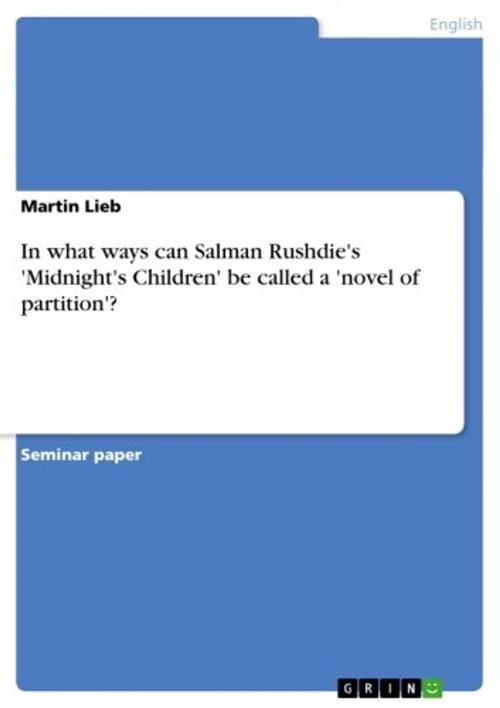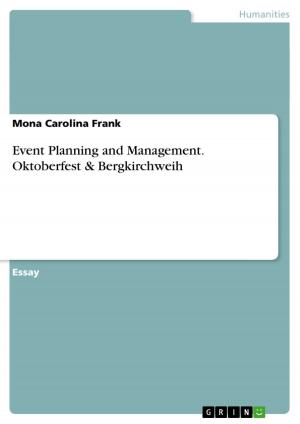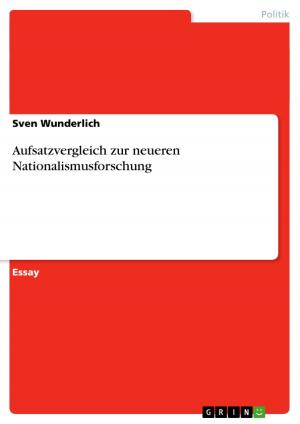In what ways can Salman Rushdie's 'Midnight's Children' be called a 'novel of partition'?
Fiction & Literature, Literary Theory & Criticism, British| Author: | Martin Lieb | ISBN: | 9783638050418 |
| Publisher: | GRIN Verlag | Publication: | May 19, 2008 |
| Imprint: | GRIN Verlag | Language: | English |
| Author: | Martin Lieb |
| ISBN: | 9783638050418 |
| Publisher: | GRIN Verlag |
| Publication: | May 19, 2008 |
| Imprint: | GRIN Verlag |
| Language: | English |
Seminar paper from the year 2003 in the subject English Language and Literature Studies - Literature, grade: 66%, University of Sussex (University of Sussex - Humanities), course: Postcolonial Perspectives, 3 entries in the bibliography, language: English, abstract: I will not quite deal with the novel just under this focus, as the question was probably intended to be, but I will also discuss the book under the aspect of East and West, Orient and Occident ( if such separations are possible is certainly another question), and maybe make some references to Rushdie's more recent novels the ground beneath her feet and Fury. Midnight's Children tells the life story of two children who are born exactly at the stroke of midnight on August 15th 1947, the day India and Pakistan achieved their independence from Great Britain, in a Hospital in Bombay. They are exchanged at birth, and so the narrator, Saleem Sinai, grows up in a well-to-do Muslim family, while his later rival, Shiva, has to live in a low-caste Hindu environment. Shiva is not even raised by Saleem's biological father, since his wife, who dies right away, has been unfaithful to her husband with a departing English colonist. Rushdie intermingles the life and family story of Saleem, who tells it, orally and in his probably dying days, to a young woman named Padma, with the history of the Indian subcontinent in his 30 years of life. Together with India, 1001 children ( see the reference to Princess Scheherezade and the Oriental, Arabian Stories of 1001 Nights) are born in the hour of midnight, who all develop special gifts, one can travel through time, the over can change sexes and Saleem becomes capable of telepathy, which makes him an omniscient narrator and, with Shiva closest to midnight and so most powerful, the possible head over the 'midnight parliament', in which he could gather all the Midnight's Children to save the nation, but the project is not undertaken, because it would reveal Shiva, now a brutal killer and India's greatest war hero, the truth about his parents. In this summary of the plot, which is not totally correct, I think, I have already done a little bit of interpretation, but now I will devote myself fully to the discussion of the essay question and the differences between East and West, as presented by Rushdie, and maybe point to a few developments he seems to have made in his recent novels.
Seminar paper from the year 2003 in the subject English Language and Literature Studies - Literature, grade: 66%, University of Sussex (University of Sussex - Humanities), course: Postcolonial Perspectives, 3 entries in the bibliography, language: English, abstract: I will not quite deal with the novel just under this focus, as the question was probably intended to be, but I will also discuss the book under the aspect of East and West, Orient and Occident ( if such separations are possible is certainly another question), and maybe make some references to Rushdie's more recent novels the ground beneath her feet and Fury. Midnight's Children tells the life story of two children who are born exactly at the stroke of midnight on August 15th 1947, the day India and Pakistan achieved their independence from Great Britain, in a Hospital in Bombay. They are exchanged at birth, and so the narrator, Saleem Sinai, grows up in a well-to-do Muslim family, while his later rival, Shiva, has to live in a low-caste Hindu environment. Shiva is not even raised by Saleem's biological father, since his wife, who dies right away, has been unfaithful to her husband with a departing English colonist. Rushdie intermingles the life and family story of Saleem, who tells it, orally and in his probably dying days, to a young woman named Padma, with the history of the Indian subcontinent in his 30 years of life. Together with India, 1001 children ( see the reference to Princess Scheherezade and the Oriental, Arabian Stories of 1001 Nights) are born in the hour of midnight, who all develop special gifts, one can travel through time, the over can change sexes and Saleem becomes capable of telepathy, which makes him an omniscient narrator and, with Shiva closest to midnight and so most powerful, the possible head over the 'midnight parliament', in which he could gather all the Midnight's Children to save the nation, but the project is not undertaken, because it would reveal Shiva, now a brutal killer and India's greatest war hero, the truth about his parents. In this summary of the plot, which is not totally correct, I think, I have already done a little bit of interpretation, but now I will devote myself fully to the discussion of the essay question and the differences between East and West, as presented by Rushdie, and maybe point to a few developments he seems to have made in his recent novels.















